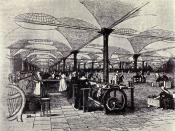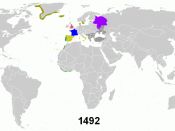1. IntroductionGLOBALIZATION AND DIFFERING growth among countries have a long but somewhat interrupted history. In a world of globalized knowledge and markets, simple neoclassical growth models predict convergence of levels of income and of growth rates, but even within the "Atlantic Economy"--the culturally and institutionally similar economies of Europe and the regions of European settlement--convergence has been uneven (Moses Abramovitz 1986; Nicholas Crafts 2000). For a century before the First World War, technological change and economic policy led to globalization with uneven income convergence. The First World War disrupted globalization for more than a generation. Following the Second World War, globalization and income convergence again emerged as prominent trends. Much of the comparative economic history of the nineteenth century focuses on the spread of the Industrial Revolution from Britain. Incomes converged, in this view, as the transfer of superior technology raised incomes in the periphery. In Globalization and History, Kevin O'Rourke and Jeffrey Williamson provide a historically focused introduction to late nineteenth century globalization (which probably had greater impact on the various Atlantic economies than even the rapid globalization of the recent past) and challenge this technological approach.
They argue that neoclassical effects of trade and factor supply changes provide more insight. Increased trade, stimulated by falling transportation costs, and factor movements caused prices of locally scarce factors to fall and promoted factor price convergence.
In the decades after the Napoleonic Wars, trade barriers fell dramatically, and capital and labor became exceptionally mobile. A dismantling of the byzantine tariffs, prohibitions, and regulations of the eighteenth century mercantilist empires began the process. From mid-century, the technology of iron and steam conquered distance, dramatically reducing the natural protection that transportation cost had hitherto provided. In the last quarter of the century, political reaction to imports and immigration slowed international convergence...


